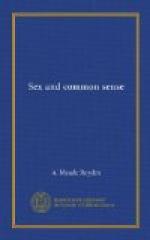VII
FRIENDSHIP
“Saul and Jonathan were lovely and pleasant in their lives, and in their death they were not divided: they were swifter than eagles, they were stronger than lions. Ye daughters of Israel, weep over Saul, who clothed you in scarlet, with other delights, who put on ornaments of gold upon your apparel. How are the mighty fallen in the midst of the battle! Oh Jonathan, thou wast slain in thine high places. I am distressed for thee, my brother Jonathan: very pleasant hast thou been unto me: thy love to me was wonderful, passing the love of women. How are the mighty fallen, and the weapons of war perished!” (II. Sam. i. 23-27.)
“And Orpah kissed her mother-in-law; but Ruth clave unto her. And she said, Behold thy sister-in-law has gone back unto her people, and unto her gods: return thou after thy sister-in-law. And Ruth said, Intreat me not to leave thee, or to return from following after thee: for whither thou goest, I will go; and where thou lodgest, I will lodge: thy people shall be my people, and thy God my God: Where thou diest, will I die, and there will I be buried: the Lord do so to me, and more also, if ought but death part me and thee.” (Ruth i. 14-17.)
People have sometimes discussed with me whether it is right to have as intense and absorbing a love for a friend of one’s own sex as exists between lovers. The word “absorbing” is perhaps the difficulty in their minds. All love is essentially the same, and it has been pointed out that the great classic instances of great love have been almost as often between friends as between lovers. But the test of love’s nobility remains the same. If it is in the strict sense “absorbing”—if, that is, it is exclusive, if it narrows one’s interests instead of enlarging them, if it involves a failure in love or sympathy with other people, it is wrong—it is not in the true sense “love”; but if it enriches the understanding, widens interest, deepens sympathy—if, in a word, to love one teaches us to love others better, then it is good, it is love indeed. A friendship which is of such character that no one outside it is of any interest, a maternal love which not only concentrates on its own but wholly excludes all other children, even a marriage which ultimately narrows rather than widens and is exclusive in its interests, is a poor caricature of love. A young mother may, in the first rapture of her motherhood, seem wholly absorbed; but, as a matter of fact, she generally ends by caring more for all children because she loves one so deeply. Even lovers, after the first absorption of newly-discovered joy, must learn to share their happiness and the happiness of their home with others if it is not to grow hard and dull. And friends may easily estimate the worth of their friendship by the measure with which it has humanized their relations to all other human beings.




